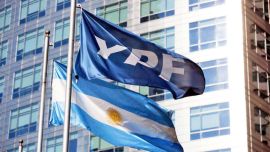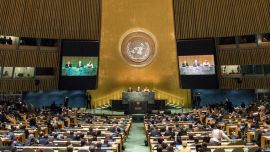As announced by this newspaper last weekend, the provinces of Buenos Aires and Río Negro were disputing a million-dollar investment to the last inch to commission a liquefied natural gas (LNG) plant in their territory for export: this “fight” was finally settled in favour of the town ruled by Alberto Weretilneck.
The news is a hard setback for Axel Kicillof for not having adhered to the RIGI Big Investment Incentive Regime pushed by the government. The project, announced as the “biggest investment in the history” of this country, involves between US$30 billion and US$50 billion.
The joint LNG plant, between YPF and Malaysian state company Petronas, will be built in Río Negro and not Buenos Aires Province, the other area disputing the arrival of the mega-investment. Thus, the chance for the ambitious infrastructure project to be settled in Bahía Blanca, one of its possible settings until now, has vanished.
Given the scale of the project and the economic potential for the region, this definition dealt a major blow to Governor Kicillof.
In fact, President Javier Milei himself had implied in an interview that Buenos Aires Province might suffer this setback, with strong criticism against the Governor, whom he dubbed a “serial expropriator”.
While Bahía Blanca was still in the running for the ambitious project, Milei stressed that the province “has the hindrance of having Kicillof” and then relaunched the tension with the province’s chief executive in the Bases Law. “If he had wanted to do things right, he would have adhered to the national RIGI”, the head of State underlined.
In the context of the negotiations, Kicillof regretted those statements and called for this backdrop of political tension with the government not to have a negative impact on the town proposed by his province to receive this multi-million-dollar investment.
“I hope YPF and Petronas handle the matter seriously and professionally, without letting themselves be influenced by the outdated comments spat daily by the President which have already brought us into conflict with our more strategic business partners such as China, Brazil, Spain, Colombia and France”, the Buenos Aires Province Governor said.
The decision was made by the companies taking into account that while Río Negro has already adhered to the RIGI, Buenos Aires Province is still considering its path, according to inside sources.
The plant will be located in the Punta Colorada area, in Sierra Grande, Río Negro, where an old unused bridge overlooking the Atlantic ocean will be appraised and upgraded.
After a study commissioned to an international consultancy to ensure the transparency of the operation, the choice was to install the plant in Río Negro, rather than the initial proposal of building it in Bahía Blanca, Buenos Aires Province.
Neuquén Governor Rolando Figueroa had already anticipated earlier that today might be “a great day for Patagonians. The port in Río Negro will be a great opportunity for the region”.
Even though the RIGI is national and constitutionally it does not need adherence by provinces, the president and CEO of YPF, Horacio Marín, demanded a good will gesture from both competing provinces.
While Alberto Weretilneck, from Río Negro, stated his unconditional adherence to the RIGI and used his influence for the provincial Legislature and different municipal government to accept it and promise tax exemptions -Gross Income, Stamp Duty, and other levies-, Kicioff only stuck to the LNG law, which had been preliminarily approved in the Chamber of Deputies in 2023 and a lot less generous than the RIGI, according to sources from the oil sector.
American consultancy Arthur D. Little, which assessed the technical and economic conditions of both locations, intervened in the evaluation process.
Horacio Marín, president of YPF, had already warned that “without the RIGI, there’s no LNG”, in what was interpreted as a request to the Buenos Aires Province government to adhere to that regime in the provincial Legislature.
Analysts explained that the RIGI was the decisive factor tilting the scales towards Río Negro.
Companies pay close attention to the deferral of jurisdiction, to solve any legal dispute in New York Courts in the United States, or in the World Bank’s International Centre for Settlement of Investment Disputes (ICSID), rather than in Argentina.
Río Negro, in turn, obtained the political support of Patagonian governors and the unions representing oil workers.
The LNG plant will be built in Punta Colorada, opposite the San Matías Gulf, starting in 2031.
Two barges will be place beforehand to serve as floating liquefaction units.
In all, the project covers the export of 460 vessels per year, meaning some 120 million m3 per day (MMm3/d) of natural gas and a volume of US$15 billion in overseas sales.
For that purpose, YPF and Petronas have to get a buyer or off-taker and large-scale financing.
Argentina’s current production reaches 135 to 140 MMm3/d of natural gas, and thus it should be nearly doubled in 7 years.
In addition, in early July, Pan American Energy (PAE) announced an agreement with Norwegian Golar LNG to start to develop LNG for some 11 MMm3/d, and could also define its location in Río Negro, to ultimately escalate in the future, after 2027, to some 27 MMm3/d.
– TIMES/PERFIL



















Comments